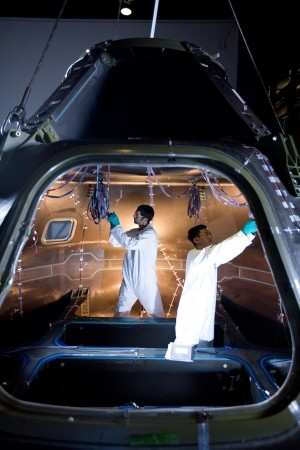Fri, Oct 16, 2009
A Crew Module Structure Made Of Composite Materials
 Alliant Techsystems said Thursday it has delivered a
technological first to NASA: a full-scale, crew module structure
made of composite materials. The Composite Crew Module (CCM) is a
unique capsule design that has the potential to reduce the overall
weight of future manned launch vehicles.
Alliant Techsystems said Thursday it has delivered a
technological first to NASA: a full-scale, crew module structure
made of composite materials. The Composite Crew Module (CCM) is a
unique capsule design that has the potential to reduce the overall
weight of future manned launch vehicles.
Composite structures reduce launch costs through weight savings
and are presently used on a variety of space launch vehicles and
aerospace structures. However, the CCM is unique in that it was
specifically designed and built to resemble a space capsule.
Full-scale structural testing will be performed at NASA's Langley
Research Center to determine the strength and viability of the
composite structure. During the destructive testing, the CCM will
be placed under load conditions similar to those observed during
launch, on-orbit, landing, and abort scenarios.
Led by the NASA Engineering and Safety Center (NESC), ATK was
part of a team of NASA and industry experts who designed and
fabricated the CCM to demonstrate how composite materials could be
used to develop a pressurized space capsule. ATK is a major
composite manufacturer and supplier for modern military and
commercial aircraft, and space launch vehicles. ATK provided
composites design, analysis, manufacturing and assembly expertise
for the CCM program.

"ATK has decades of experience in building composite structures
for launch vehicles, military aircraft, and most recently
commercial aircraft such as the Airbus A350," Jack Cronin,
President, ATK Mission Systems. "We have applied our innovative
engineering and manufacturing capabilities to help the CCM team
build a cutting-edge, composite space structure. We demonstrated
our ability to perform, partner and deliver an advanced composite
structure that's never been built for NASA."
Fabricated and assembled at ATK's Iuka, Miss. facility, the CCM
combines some of the most advanced composite manufacturing
technologies in use today. Constructed in two primary sections, the
upper and lower shells are joined together with a splice joint and
cured using out-of-autoclave technology. The bonding of the
composite assemblies and integration of metal hardware were
achieved by combining existing technology and ATK's innovative
manufacturing processes.
More News
He Attempted To Restart The Engine Three Times. On The Third Restart Attempt, He Noticed That Flames Were Coming Out From The Right Wing Near The Fuel Cap Analysis: The pilot repor>[...]
Make Sure You NEVER Miss A New Story From Aero-News Network Do you ever feel like you never see posts from a certain person or page on Facebook or Instagram? Here’s how you c>[...]
From 2009 (YouTube Edition): Leading Air Show Performers Give Their Best Advice for Newcomers On December 6th through December 9th, the Paris Las Vegas Hotel hosted over 1,500 air >[...]
Aero Linx: NASA ASRS ASRS captures confidential reports, analyzes the resulting aviation safety data, and disseminates vital information to the aviation community. The ASRS is an i>[...]
“For our inaugural Pylon Racing Seminar in Roswell, we were thrilled to certify 60 pilots across our six closed-course pylon race classes. Not only did this year’s PRS >[...]
 NTSB Final Report: Rutan Long-EZ
NTSB Final Report: Rutan Long-EZ ANN FAQ: Turn On Post Notifications
ANN FAQ: Turn On Post Notifications Classic Aero-TV: ICAS Perspectives - Advice for New Air Show Performers
Classic Aero-TV: ICAS Perspectives - Advice for New Air Show Performers ANN's Daily Aero-Linx (06.28.25)
ANN's Daily Aero-Linx (06.28.25) Aero-News: Quote of the Day (06.28.25)
Aero-News: Quote of the Day (06.28.25)




